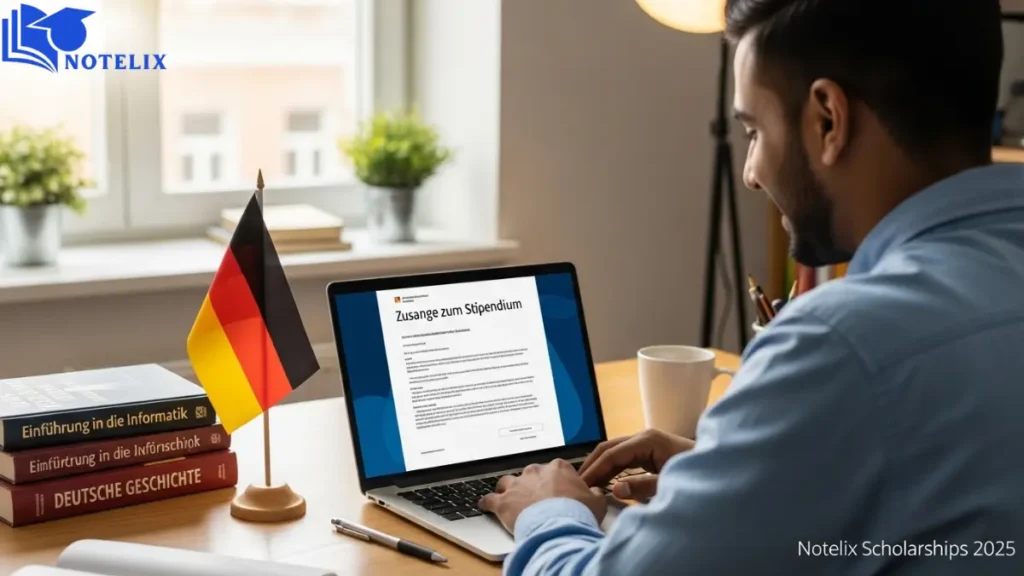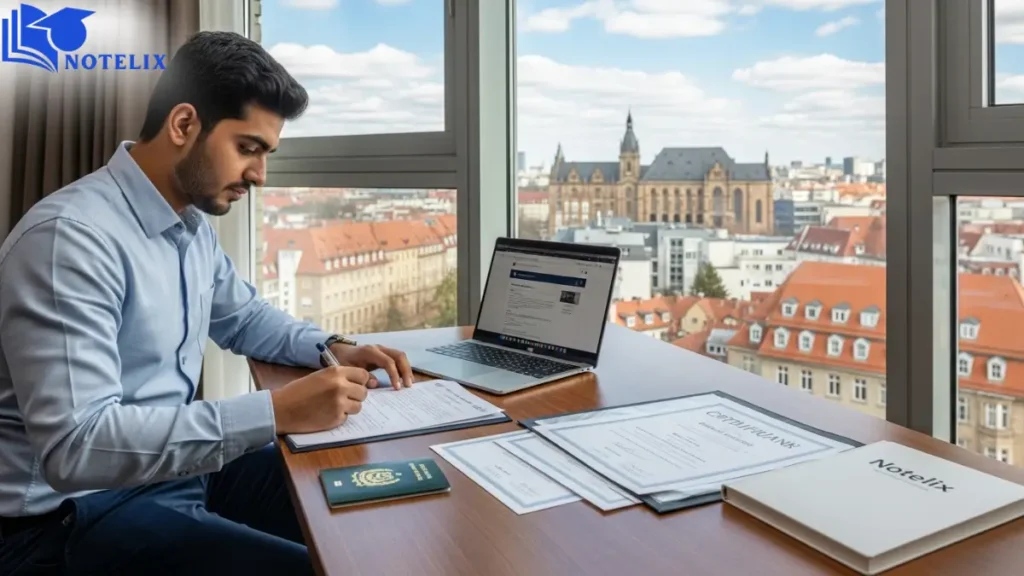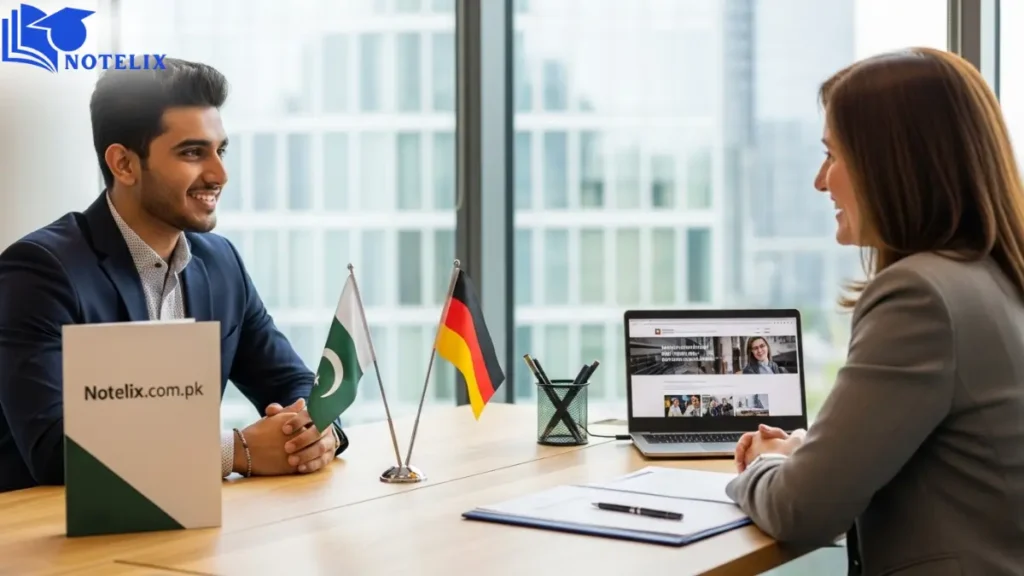Every year, thousands of Pakistani students apply for scholarships in Germany. The main question I get from my students is, “Sir, what are the best scholarships in Germany for us?” So, I’ve decided to write this detailed guide not just from what’s available online, but based on verified sources and practical experience.
Germany is one of the most affordable countries to study in Europe. And with scholarships, it becomes even better nearly free for many international students. If you are planning to apply in 2025, now is the right time to prepare.
Why Germany is a top Choice for Pakistani Students?
Germany is popular among Pakistani students for a few key reasons:
- No tuition fees at public universities
- High-quality education and research
- Affordable living costs compared to the UK or USA
- Globally recognized degrees
- Safe and student-friendly environment
I’ve personally guided many of my students who are now studying in cities like Berlin, Munich, and Frankfurt. Almost all of them received partial or full scholarships.

Top 6 Scholarships in Germany for Pakistani Students in 2025
1. DAAD Scholarships (Deutscher Akademischer Austauschdienst)
DAAD is Germany’s largest funding organization. If you ask me, this should be your first option.
Benefits:
- Full tuition coverage
- Monthly stipend (€934 for graduates, €1,200 for doctoral students)
- Travel allowance
- Health insurance
Who Can Apply:
- Master’s and PhD students
- Some DAAD programs are available for undergraduates too
Application Deadline:
- Most deadlines fall between October and December 2024 for the 2025 intake
Where to Apply:
- Click Here To Apply: Apply Now
Important Tip: Choose a program taught in English and check DAAD’s “Scholarship Database.”
2. Erasmus+ Program (For Joint European Degrees)
Though it’s a European Union scholarship, many German universities participate in Erasmus+. I’ve seen Pakistani students getting accepted here easily.
Benefits:
- Covers tuition
- Monthly living allowance
- Travel costs
- Study in multiple countries (including Germany)
Who Can Apply:
- Mostly Master’s students
Application Time:
- October 2024 to January 2025
Platform:
- Check: Apply now
3. Heinrich Böll Foundation Scholarships
If you’re interested in social sciences, environmental studies, or human rights, this scholarship might suit you.
Benefits:
- €850 per month for graduates
- €1,200 per month for doctoral students
- Health insurance
Eligibility:
- Pakistani students studying or planning to study in Germany
- Strong academic record and social engagement
Apply By:
- March 1 and September 1 every year
Visit: https://www.boell.de
4. Konrad-Adenauer-Stiftung (KAS) Scholarships
The Konrad-Adenauer Foundation offers scholarships to international students, especially those committed to political and social engagement.
What You Get:
- Monthly stipend: €934 for master’s students
- Doctoral students get €1,200
- Health insurance and family allowance (if applicable)
- Support for research and networking
Eligibility Criteria:
- Strong academic performance
- Interest in politics, law, economics, or social sciences
- Proof of leadership and commitment to community service
Deadline:
- Usually between June and July each year
Official Website: https://www.kas.de
This scholarship has strict selection. A well-written motivation letter and clear personal vision are must-haves.
5. Friedrich Ebert Stiftung Scholarships
This is another great opportunity, especially for students who are socially active and interested in justice, politics, or human rights.
Scholarship Benefits:
- €850-€1,200 monthly stipend
- Health insurance
- Family support (if required)
Who Should Apply:
- Students in social sciences, humanities, and public policy
- Bachelor’s, Master’s, or PhD levels
- Good academic results and community involvement
Application Timeframe:
- Open all year, but apply 6-7 months before the semester
Apply Here: https://www.fes.de/
6. Rosa Luxemburg Foundation Scholarship
Pakistani students involved in social justice, activism, or human rights may find this option valuable.
Funding Includes:
- Full tuition support
- Monthly living stipend
- Travel and health allowances
Ideal Candidates:
- Master’s or PhD students
- Strong engagement in civil society or volunteer work
- Passion for critical thinking and diversity
Next Deadline:
- April 1 and October 1 every year
Scholarship Page: https://www.rosalux.de
Note: Political orientation and activism may play a role here, so apply only if it aligns with your background.
Are Scholarships in Germany Really Worth It?
Most German scholarships are fully funded. Even if you don’t get full coverage, partial scholarships can reduce your costs by over 70%.
Let me give you a practical breakdown:
| Cost Component | Without Scholarship (Euro/month) | With Scholarship (Euro/month) |
|---|---|---|
| Tuition Fees | 0 – 1,500 | 0 |
| Accommodation | 300 – 600 | 0 – 300 |
| Food & Living | 250 – 350 | 100 – 200 |
| Health Insurance | 80 – 120 | 0 |
| Total | 630 – 2,570 | 100 – 500 |
So yes if you receive funding, your monthly cost drops drastically.
Can Undergraduate Pakistani Students Apply? Yes But Options Are Limited
Most scholarships in Germany target Master’s and PhD students. However, there are some options for undergraduate students too.
Some Options for Bachelor’s Level
- DAAD Undergraduate Exchange Programs
- German University-specific merit scholarships
- Private German foundations and NGOs
Although fewer, these are highly competitive. If you’re in college or intermediate level now, focus on building your profile like GPA, language skills (IELTS), and social engagement.
English or German? Which Language Should You Prepare?
Most German universities offer English-taught programs, especially at the graduate level. However, knowing basic German (A1 or A2 level) can be a huge plus, both during application and when living in Germany.
I always recommend my students to start learning German while preparing their documents. It adds value to your scholarship application.

Documents Required for Scholarship Applications in Germany
Let’s get one thing clear: German institutions are very strict about documentation. Missing even one item can cost you the opportunity.
Here are the key documents you’ll usually need:
- Valid passport
- Academic transcripts
- Letter of motivation
- Recommendation letters
- Language proficiency (IELTS/TOEFL or German A1)
- Updated CV (Europass format)
- Research proposal (for PhD)
Prepare these documents at least 2-3 months in advance of the deadline.
What Makes a Strong Motivation Letter?
If I had to give one tip to increase your scholarship chances, it would be: write a powerful motivation letter. This letter explains why you want to study in Germany, why this scholarship suits you, and what your goals are.
Here’s what works:
- Start with your background and motivation
- Explain why you chose Germany and your program
- Show how your goals match the scholarship’s mission
- Mention any research, social work, or academic achievements
- End with your future plans (especially for Pakistan)
Avoid general statements like “I want to explore new opportunities”. Be specific. Be personal. Be real.
How Can Pakistani Students Apply Strategically?
Having reviewed hundreds of scholarship cases, I suggest the following strategy for Pakistani applicants:
- List 3-5 scholarships that match your field
- Track deadlines in a spreadsheet
- Prepare one base motivation letter, then customize it for each
- Take IELTS or TOEFL early, scores are often mandatory
- Use the Europass CV format, it’s preferred in Europe
- Have at least two recommendation letters ready
Application Calendar for 2025 Scholarships
| Scholarship | Application Period (Estimated) |
|---|---|
| DAAD | October 2025 – December 2025 |
| Erasmus+ | October 2025 – January 2025 |
| Heinrich Böll Foundation | March 1 / September 1 |
| Konrad Adenauer Stiftung | May – July 2025 |
| Friedrich Ebert Stiftung | Rolling – Apply early |
| Rosa Luxemburg Foundation | April 1 / October 1 |
Important Tip: Always double-check the official websites for updated deadlines.
Avoid These Common Mistakes
Even brilliant students miss out on scholarships because of basic errors. Here are some mistakes I see often:
- Applying too close to the deadline
- Submitting incomplete documents
- Using the same letter for every application
- Not tailoring your CV to each scholarship
- Ignoring the German language certificate, even at basic level
- Not checking the specific eligibility requirements of each foundation
German Student Visa Tip for Scholarship Holders
If you’re selected for a scholarship, your visa process becomes much easier. The embassy prioritizes funded students.
However, you still need:
- Valid admission letter
- Proof of scholarship
- Academic documents
- Visa fee and biometric appointment
I always advise students to book their visa slot early ideally 3-4 months in advance.
Step-by-Step Guide to Applying for German Scholarships
Applying for scholarships can feel overwhelming. But if you follow a step-by-step approach, the process becomes manageable.
Here’s how I guide my students:
Step 1: Research Scholarships Early
Start at least 8–10 months before your desired intake.
Use reliable sources like:
- https://www.daad.de/en/
- Official websites of universities and foundations
- https://scholarships.notelix.com.pk for Pakistani-specific advice
Step 2: Choose Your Study Program
Pick a course that matches your previous education.
Make sure the program is taught in English (if you don’t know German).
Each scholarship has a list of eligible programs so match it carefully.
Step 3: Check Eligibility Criteria
Common criteria include:
- Pakistani citizenship
- Excellent academic record
- Valid language test (IELTS or TestDaF)
- Relevant field of study
- Letter of motivation
Some also prefer social engagement or research potential.
Step 4: Prepare Required Documents
Here’s a checklist I always share:
| Document | Details |
|---|---|
| Academic Transcripts | Verified, with GPA mentioned clearly |
| Degree Certificates | Attested copies, translated if required |
| Language Certificate | IELTS, TOEFL, or German (A1-B2) |
| CV | Use Europass format |
| Letter of Motivation | Personalized for each scholarship |
| Recommendation Letters | At least 2, from professors or supervisors |
| Passport Copy | Valid for at least 1 year |
Prepare your documents in both hard and soft copy format.
Step 5: Apply Before the Deadline
Upload all documents through the official portal or email, depending on the foundation.
Always submit at least 2 weeks before the deadline to avoid technical issues.
Language Tests for German Scholarships
Most scholarships require proof of English proficiency. But for some programs, especially social sciences or German-taught courses, you also need basic German language certification.
Here’s a quick comparison:
| Test | Accepted For | Minimum Score Required |
|---|---|---|
| IELTS | Most programs | 6.5 overall (some need 7.0) |
| TOEFL iBT | All DAAD programs | 80–100 |
| TestDaF | German-taught courses | Level 4 (TDN4) |
| Goethe Zertifikat | General German use | A1–B2 depending on program |
Tip: If you’re applying for English programs, IELTS Academic is the safest choice.

Best Fields to Study in Germany for Pakistani Students
Over the years, I’ve seen these fields offer the most scholarships and career opportunities:
- Engineering and Technology
- Computer Science and IT
- Renewable Energy
- Public Health
- Environmental Sciences
- Social Sciences
- Economics and Development Studies
Germany is investing heavily in STEM and sustainability. So if you’re in these areas, your chances are high.
Top German Universities That Offer Scholarships
Several public universities in Germany offer university-specific scholarships for international students.
Here are some of the top options:
| University | Scholarship Type |
|---|---|
| TU Munich | Academic merit scholarships, DAAD funded |
| Heidelberg University | Research grants, DAAD, state scholarships |
| University of Freiburg | Deutschlandstipendium, Erasmus+ |
| RWTH Aachen | Graduate scholarships, technical programs |
| Humboldt University Berlin | PhD grants, research funding |
Some universities also waive semester fees for scholarship holders. Always visit each university’s international office website to check what’s currently available.
How to Build a Strong Academic Profile (Tips for Pakistani Students)
To stand out in the application pool, you need more than just marks.
Here’s what I always tell my students:
- GPA above 3.0 (on 4.0 scale) is a strong start
- English language score of IELTS 7.0 gives you an edge
- Engage in social or volunteer activities, it shows leadership
- Start a small research project or write a paper if applying for MS/PhD
- Take online courses (Coursera, edX) related to your program
- Get internships or work experience related to your field
Your goal is to show that you’re motivated, consistent, and serious about your future.
Scholarships for Pakistani Women to Study in Germany
There are specific scholarships and preferences for female students in STEM fields.
For example:
- DAAD offers women-in-tech priority for some programs
- KAS and FES give importance to gender balance
- Deutschlandstipendium encourages female STEM applicants
If you are a female student in Pakistan and want to apply in 2025, this could be a real advantage for you.
Top Tips to Increase Your Chances of Winning a Scholarship
I’ve helped many Pakistani students secure fully funded scholarships in Germany. Based on that experience, here are my top practical tips:
1. Apply Early
Start preparing your documents and shortlisting scholarships at least 6-8 months in advance. Early preparation shows seriousness and helps you avoid deadline stress.
2. Focus on Your Letter of Motivation
Make it personal. Talk about your story, why you chose your field, and how your education in Germany will contribute to your goals in Pakistan.
3. Maintain Academic Consistency
Even if your grades aren’t extraordinary, consistent improvement shows commitment. Scholarship committees value steady growth and dedication.
4. Highlight Social and Volunteer Work
Foundations like Friedrich Ebert or Heinrich Böll give strong preference to socially active students. Your work in NGOs, student unions, or volunteer efforts matters.
5. Choose the Right Program and University
Don’t just apply to popular cities like Berlin or Munich. Explore universities in smaller cities where competition is lower, and acceptance chances are better.
6. Practice for Interviews (if applicable)
Some scholarships involve an interview stage. Be prepared to talk confidently about your academic interests, future goals, and how you plan to contribute to your community.
Quick Scholarships Overview
| Scholarship Name | Eligible Degrees | Stipend (€/month) | Deadline Range |
|---|---|---|---|
| DAAD | MS, PhD | 934 – 1,200 | Oct – Dec 2025 |
| Erasmus+ | MS | 1,000+ | Oct – Jan 2026 |
| Heinrich Böll Foundation | MS, PhD | 850 – 1,200 | Mar 1, Sep 1 |
| Friedrich Ebert Stiftung | BS, MS, PhD | 850 – 1,200 | Rolling (Apply Early) |
| Konrad Adenauer Stiftung | MS, PhD | 934 – 1,200 | May – July 2025 |
| Rosa Luxemburg Foundation | MS, PhD | 850 – 1,200 | Apr 1, Oct 1 |
Final Words
As a professor in Pakistan, I always guide my students toward quality education that is affordable and practical. Germany fits all of these.
It offers:
- Zero tuition fees at public universities
- Global degrees that are highly respected
- Safe environment and excellent infrastructure
- Scholarships that cover almost all living expenses
- Research opportunities and future job prospects
If you’re a Pakistani student planning for 2025, I truly believe Germany should be among your top choices.
Start now, prepare carefully, and don’t doubt your ability to succeed. I’ve seen students from small towns in Pakistan make it to top German universities all because they stayed focused and consistent.
My final advice? Start early, stay organized, and believe in your journey.
If you need help, keep visiting scholarships.notelix.com.pk, I’ll continue sharing updates, deadlines, and guidance for Pakistani students.
FAQs
Yes. Scholarships like DAAD, Heinrich Böll, and Friedrich Ebert provide full financial support covering tuition, living, and travel.
Yes. Most scholarships and universities require IELTS Academic (minimum 6.5) or TOEFL for English-taught programs.
There’s no strict age limit, but your last degree should not be older than 6 years.
Yes. You can apply with a provisional certificate and mention your expected graduation date.
No, but basic German (A1-A2) gives you an edge in applications and daily life in Germany.
Yes, you can and you should. But never use the same letter of motivation for all of them.
